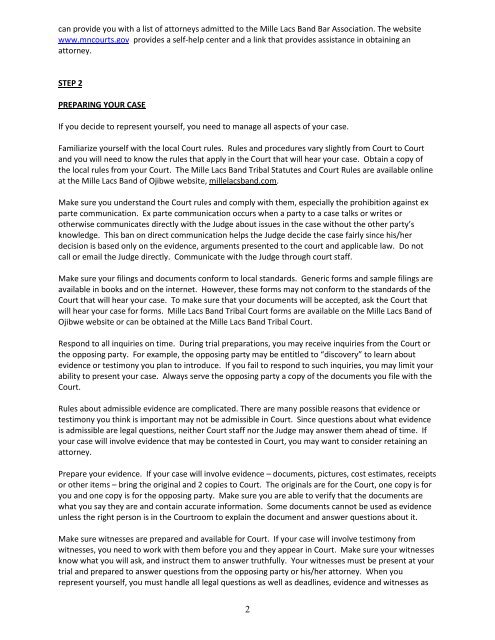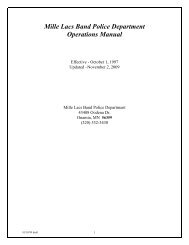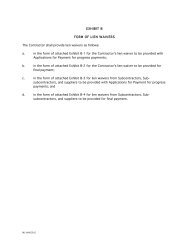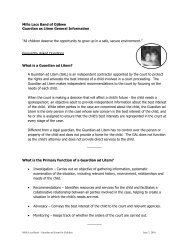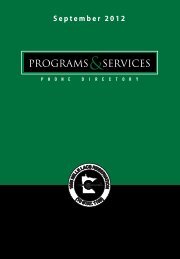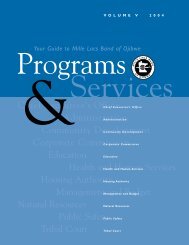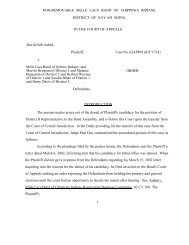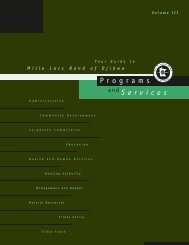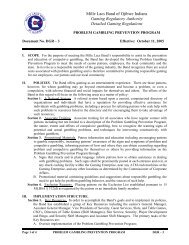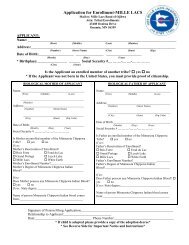Representing Yourself - Mille Lacs Band of Ojibwe
Representing Yourself - Mille Lacs Band of Ojibwe
Representing Yourself - Mille Lacs Band of Ojibwe
Create successful ePaper yourself
Turn your PDF publications into a flip-book with our unique Google optimized e-Paper software.
can provide you with a list <strong>of</strong> attorneys admitted to the <strong>Mille</strong> <strong>Lacs</strong> <strong>Band</strong> Bar Association. The website<br />
www.mncourts.gov provides a self-help center and a link that provides assistance in obtaining an<br />
attorney.<br />
STEP 2<br />
PREPARING YOUR CASE<br />
If you decide to represent yourself, you need to manage all aspects <strong>of</strong> your case.<br />
Familiarize yourself with the local Court rules. Rules and procedures vary slightly from Court to Court<br />
and you will need to know the rules that apply in the Court that will hear your case. Obtain a copy <strong>of</strong><br />
the local rules from your Court. The <strong>Mille</strong> <strong>Lacs</strong> <strong>Band</strong> Tribal Statutes and Court Rules are available online<br />
at the <strong>Mille</strong> <strong>Lacs</strong> <strong>Band</strong> <strong>of</strong> <strong>Ojibwe</strong> website, millelacsband.com.<br />
Make sure you understand the Court rules and comply with them, especially the prohibition against ex<br />
parte communication. Ex parte communication occurs when a party to a case talks or writes or<br />
otherwise communicates directly with the Judge about issues in the case without the other party’s<br />
knowledge. This ban on direct communication helps the Judge decide the case fairly since his/her<br />
decision is based only on the evidence, arguments presented to the court and applicable law. Do not<br />
call or email the Judge directly. Communicate with the Judge through court staff.<br />
Make sure your filings and documents conform to local standards. Generic forms and sample filings are<br />
available in books and on the internet. However, these forms may not conform to the standards <strong>of</strong> the<br />
Court that will hear your case. To make sure that your documents will be accepted, ask the Court that<br />
will hear your case for forms. <strong>Mille</strong> <strong>Lacs</strong> <strong>Band</strong> Tribal Court forms are available on the <strong>Mille</strong> <strong>Lacs</strong> <strong>Band</strong> <strong>of</strong><br />
<strong>Ojibwe</strong> website or can be obtained at the <strong>Mille</strong> <strong>Lacs</strong> <strong>Band</strong> Tribal Court.<br />
Respond to all inquiries on time. During trial preparations, you may receive inquiries from the Court or<br />
the opposing party. For example, the opposing party may be entitled to “discovery” to learn about<br />
evidence or testimony you plan to introduce. If you fail to respond to such inquiries, you may limit your<br />
ability to present your case. Always serve the opposing party a copy <strong>of</strong> the documents you file with the<br />
Court.<br />
Rules about admissible evidence are complicated. There are many possible reasons that evidence or<br />
testimony you think is important may not be admissible in Court. Since questions about what evidence<br />
is admissible are legal questions, neither Court staff nor the Judge may answer them ahead <strong>of</strong> time. If<br />
your case will involve evidence that may be contested in Court, you may want to consider retaining an<br />
attorney.<br />
Prepare your evidence. If your case will involve evidence – documents, pictures, cost estimates, receipts<br />
or other items – bring the original and 2 copies to Court. The originals are for the Court, one copy is for<br />
you and one copy is for the opposing party. Make sure you are able to verify that the documents are<br />
what you say they are and contain accurate information. Some documents cannot be used as evidence<br />
unless the right person is in the Courtroom to explain the document and answer questions about it.<br />
Make sure witnesses are prepared and available for Court. If your case will involve testimony from<br />
witnesses, you need to work with them before you and they appear in Court. Make sure your witnesses<br />
know what you will ask, and instruct them to answer truthfully. Your witnesses must be present at your<br />
trial and prepared to answer questions from the opposing party or his/her attorney. When you<br />
represent yourself, you must handle all legal questions as well as deadlines, evidence and witnesses as<br />
2


